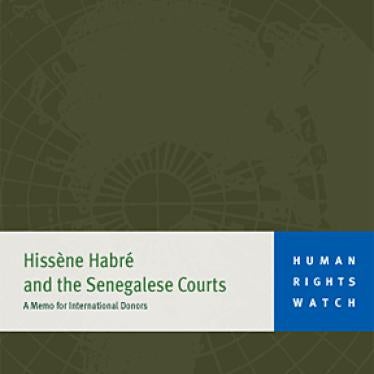A coalition of human rights groups today urged a Senegalese court to arrest the former dictator of Chad, Hissein Habre.
In a criminal complaint filed in Dakar on behalf of hundreds of victims of torture, political murder and "disappearances," Human Rights Watch, together with Chadian and Senegalese activists, accused Habre of crimes against humanity and torture during his 1982-1990 rule. Habre has lived in Senegal since he was deposed in December 1990 by current president Idriss Deby.
"Hissein Habre is Africa's Pinochet," said Reed Brody, Advocacy Director of Human Rights Watch. "By bringing him to justice, Senegal can take an historic step towards ending the cycle of impunity that has plagued the continent." Brody noted that Senegal was the first country to ratify the Rome Statute of the International Criminal Court.
In papers presented to an investigating judge in Dakar, the groups provided details of 97 cases of political killings, 142 cases of torture and 100 cases of "disappearance." Nine individual Chadians are named as private plaintiffs, as is the Chadian Association of Victims of Political Repression and Crime which represents 792 victims of Habre's brutality.
"This is the first case of African victims asking the court of another African country to prosecute a former African dictator," said Alioune Tine of the Dakar-based African Assembly for the Defense of Human Rights (RADDHO). "This prosecution cannot only provide some justice to Habre's thousands of victims, but help put an end to the routine practice of the worst tyrants to move into comfortable exile next door."
Joining Human Rights Watch in today's actions were RADDHO, the Chadian Association for the Promotion and Defense of Human Rights, the Chadian League for Human Rights (LTDH), the National Organization for Human Rights (Senegal), the London-based Interights, the International Federation of Human Rights Leagues (FIDH) and the French organization Agir Ensemble.
Habre, now 57 years old, took power in the former French colony of Chad in 1982, overthrowing the government of Goukouni Wedeye. Habre's one-party regime was marked by widespread abuse. He periodically targeted various ethnic groups such as the Hadjerai (1987) and the Zaghawa (1989) killing and arresting members en masse under the pretext that they posed a threat to the regime. Just before Habre fled in 1990, his Presidential Guard allegedly killed more than 300 political prisoners who had been secretly detained at the President's headquarters in the capital, N'Djamena.
The exact number of Habre's victims is not known. A truth commission established by the Deby government accused Habre's government of 40,000 political murders and 200,000 cases of torture. Most were carried out by his dreaded secret police, the National Security Service (Direction de la Documentation et de la Sécurité - DDS) composed of 8,000 agents.
The truth commission also accused Habre of taking some seven billion CFA francs (11.6 million dollars) with him when he fled to Senegal. In 1998, Chad's then Justice Minister Limane Mahamat said that Chad would seek Habre's extradition from Senegal, but no formal request was made. Chad did institute a successful lawsuit in Senegal to recover the airplane in which Habre fled.
The United States and France supported Habre throughout his rule, seeing him as a bulwark against Libya's Moemmar Khadaffi. Under President Ronald Reagan, the U.S. gave covert CIA paramilitary support to help Habre take power in order, according to Secretary of State Alexander Haig, to "bloody Khadaffi's nose." The U.S later provided Habre with tens of millions of dollars per year as well as military intelligence information.
The organizations presented the sworn testimony of two former prisoners who were ordered by the DDS to dig mass graves to bury Habre's opponents. In addition to those killed, many prisoners died of starvation, malaria or dysentery. Torture was widespread in Habre's detention centers. One frequent method, suffered by two of the plaintiffs in today's action, was the "Arbatachar," in which a prisoner's four limbs were tied together behind his back, leading to loss of circulation and paralysis. Prisoners were also subject to electric shocks, drownings and beatings. In their court papers, the groups cited Senegal's obligations under international law to prosecute those accused of crimes against humanity. It also invoked the Senegalese statute on torture as well as the 1984 United Nations Convention against Torture, which Senegal ratified in 1987 and which obliges states to either prosecute or extradite alleged torturers who enter its territory. This Convention was the basis for Britain's detention of Gen. Augusto Pinochet.
Human Rights Watch took part in the Pinochet case in Britain's House of Lords and has since campaigned to bring other former tyrants to justice. Among other human rights criminals now in exile, the group cited Uganda's Idi Amin currently living in Saudi Arabia, Haiti's Raul Cedras in Panama, Paraguay's Alfredo Stroessner in Brazil and Haiti's death squad leader Emmanuel "Toto" Constant in the United States. When Ethiopian dictator Mengistu Haile Mariam, who has lived in Zimbabwe since 1991, visited South Africa in November 1999 for medical treatment Human Rights Watch campaigned unsuccessfully for his arrest.
The Habre investigation began when the Chadian Association for the Promotion and Defense of Human Rights requested Human Rights Watch's assistance. Two lawyers with the Harvard Law School Human Rights Program visited Chad in July-August 1999 to gather evidence. In November-December 1999, Human Rights Watch consultant Pascale Kambale and RADDHO director Alioune Tine returned to Chad to finish the investigation and arrange today's criminal complaint, which was prepared with the assistance of the FIDH.






